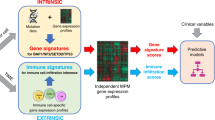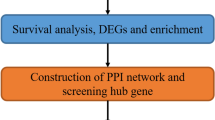Abstract
Introduction
Malignant pleural mesothelioma (MPM) is an aggressive, treatment-resistant tumor. Anoikis is a particular type of programmed apoptosis brought on by the separation of cell–cell or extracellular matrix (ECM). Anoikis has been recognized as a crucial element in the development of tumors. However, few studies have comprehensively examined the role of anoikis-related genes (ARGs) in malignant mesothelioma.
Methods
ARGs were gathered from the GeneCard database and the Harmonizome portals. We obtained differentially expressed genes (DEGs) using the GEO database. Univariate Cox regression analysis, and the least absolute shrinkage and selection operator (LASSO) algorithm were utilized to select ARGs associated with the prognosis of MPM. We then developed a risk model, and time-dependent receiver operating characteristic (ROC) analysis and calibration curves were employed to confirm the ability of the model. The patients were divided into various subgroups using consensus clustering analysis. Based on the median risk score, patients were divided into low- and high-risk groups. Functional analysis and immune cell infiltration analysis were conducted to estimate molecular mechanisms and the immune infiltration landscape of patients. Finally, drug sensitivity analysis and tumor microenvironment landscape were further explored.
Results
A novel risk model was constructed based on the six ARGs. The patients were successfully divided into two subgroups by consensus clustering analysis, with a striking difference in the prognosis and landscape of immune infiltration. The Kaplan–Meier survival analysis indicated that the OS rate of the low-risk group was significantly higher than the high-risk group. Functional analysis, immune cell infiltration analysis, and drug sensitivity analysis showed that high- and low-risk groups had different immune statuses and drug sensitivity.
Conclusions
In summary, we developed a novel risk model to predict MPM prognosis based on six selected ARGs, which could broaden comprehension of personalized and precise therapy approaches for MPM.









Similar content being viewed by others
Data availability
The data from this study are available in the GEO (https://www.ncbi.nlm.nih.gov/geo/) database, TCGA (https://portal.gdc.cancer.gov/) databases, the GeneCard database (https://www.genecards.org/) and the Harmonizome portals (https://maayanlab.cloud/Harmonizome/).
Abbreviations
- MPM:
-
Malignant pleural mesothelioma
- ECM:
-
Extracellular matrix
- ARGs:
-
Anoikis-related genes
- DEGs:
-
Differentially expressed genes
- LASSO:
-
Least absolute shrinkage and selection operator
- ROC:
-
Receiver operating characteristic
- TCGA:
-
The Cancer Genome Atlas
- NPLPT:
-
Normal paired lung parenchyma tissue
- TPM:
-
Transcripts per million
- CNV:
-
Copy number variation
- PCA:
-
Principal Component Analysis
- UMAP:
-
Uniform Manifold Approximation and Projection for Dimension Reduction
- tSNE:
-
T-Distributed Stochastic Neighbor Embedding
- GSVA:
-
Gene Set Variation Analysis
- GSEA:
-
Gene Set Enrichment Analysis
- ssGSEA:
-
Single sample gene set enrichment analysis
- GDSC:
-
Genetics of Drug Sensitivity in Cancer
- TME:
-
Tumor microenvironment
References
Adeshakin FO, Adeshakin AO, AfolabiL LO et al (2021) Mechanisms for modulating anoikis resistance in cancer and the relevance of metabolic reprogramming. Front Oncol 11:626577. https://doi.org/10.3389/fonc.2021.626577
Ahluwalia P, Ahluwalia M, Mondal AK et al (2021) Immunogenomic gene signature of cell-death associated genes with prognostic implications in lung cancer. Cancers (basel) 13(1):155. https://doi.org/10.3390/cancers13010155
Ai C, Zhang J, Lian S et al (2020) FOXM1 functions collaboratively with PLAU to promote gastric cancer progression. J Cancer 11(4):788–794. https://doi.org/10.7150/jca.37323
Amoedo ND, Rodrigues MF, Rumjanek FD (2014) Mitochondria: are mitochondria accessory to metastasis? Int J Biochem Cell Biol 51:53–57. https://doi.org/10.1016/j.biocel.2014.03.009
Barrón EV, Roman-Bassaure E, Sánchez-Sandoval AL et al (2015) CDKN3 mRNA as a biomarker for survival and therapeutic target in cervical cancer. PLoS ONE 10(9):e0137397. https://doi.org/10.1371/journal.pone.0137397
Campbell RA, Campbell HD, Bircher JS et al (2021) Placental HTRA1 cleaves α1-antitrypsin to generate a NET-inhibitory peptide. Blood 138(11):977–988. https://doi.org/10.1182/blood.2020009021
Casalone E, Allione A, Viberti C et al (2018) DNA methylation profiling of asbestos-treated MeT5A cell line reveals novel pathways implicated in asbestos response. Arch Toxicol 92(5):1785–1795. https://doi.org/10.1007/s00204-018-2179-y
Chi H, Jiang P, Xu K et al (2022) A novel anoikis-related gene signature predicts prognosis in patients with head and neck squamous cell carcinoma and reveals immune infiltration. Front Genet 13:984273. https://doi.org/10.3389/fgene.2022.984273
Coste T, Hervé D, Neau JP et al (2021) Heterozygous HTRA1 nonsense or frameshift mutations are pathogenic. Brain 144(9):2616–2624. https://doi.org/10.1093/brain/awab271
Du Q, Liu W, Mei T et al (2023) Prognostic and immunological characteristics of CDK1 in lung adenocarcinoma: a systematic analysis. Front Oncol 13:1128443. https://doi.org/10.3389/fonc.2023.1128443
Fan C, Chen L, Huang Q et al (2015) Overexpression of major CDKN3 transcripts is associated with poor survival in lung adenocarcinoma. Br J Cancer 113(12):1735–1743. https://doi.org/10.1038/bjc.2015.378
Feng MX, Ma MZ, Fu Y et al (2014) Elevated autocrine EDIL3 protects hepatocellular carcinoma from anoikis through RGD-mediated integrin activation. Mol Cancer 13:226. https://doi.org/10.1186/1476-4598-13-226
Feng X, Zhang M, Wang B et al (2019) CRABP2 regulates invasion and metastasis of breast cancer through hippo pathway dependent on ER status. J Exp Clin Cancer Res 38(1):361. https://doi.org/10.1186/s13046-019-1345-2
Frisch SM, Screaton RA (2001) Anoikis mechanisms. Curr Opin Cell Biol 13(5):555–562. https://doi.org/10.1016/s0955-0674(00)00251-9
González-Llorente L, Santacatterina F, García-Aguilar A et al (2019) Overexpression of mitochondrial IF1 prevents metastatic disease of colorectal cancer by enhancing anoikis and tumor infiltration of NK cells. Cancers (basel) 12(1):22. https://doi.org/10.3390/cancers12010022
Guan X (2015) Cancer metastases: challenges and opportunities. Acta Pharm Sin B 5(5):402–418. https://doi.org/10.1016/j.apsb.2015.07.005
Gutierrez LS, Schulman A, Brito-Robinson T et al (2000) Tumor development is retarded in mice lacking the gene for urokinase-type plasminogen activator or its inhibitor, plasminogen activator inhibitor-1. Cancer Res 60(20):5839–5847
Haneke K, Schott J, Lindner D et al (2020) CDK1 couples proliferation with protein synthesis. J Cell Biol 219(3):e201906147. https://doi.org/10.1083/jcb.201906147
Hosen SMZ, Uddin MN, Xu Z et al (2022) Metastatic phenotype and immunosuppressive tumour microenvironment in pancreatic ductal adenocarcinoma: Key role of the urokinase plasminogen activator (PLAU). Front Immunol 13:1060957. https://doi.org/10.3389/fimmu.2022.1060957
Hu FF, Liu CJ, Liu LL et al (2021) Expression profile of immune checkpoint genes and their roles in predicting immunotherapy response. Brief Bioinform 22(3):bbaa176. https://doi.org/10.1093/bib/bbaa176
Ievlev V, Lynch TJ, Freischlag KW et al (2023) Krt14 and Krt15 differentially regulate regenerative properties and differentiation potential of airway basal cells. JCI Insight 8(2):e162041. https://doi.org/10.1172/jci.insight.162041
Innocente SA, Lee JM (2005) p53 is a NF-Y- and p21-independent, Sp1-dependent repressor of cyclin B1 transcription. FEBS Lett 579(5):1001–1007. https://doi.org/10.1016/j.febslet.2004.12.073
Janiszewska M, Primi M, Izard T (2020) Cell adhesion in cancer: beyond the migration of single cells. J Biol Chem 295(8):2495–2505. https://doi.org/10.1074/jbc.REV119.007759
Kocher T, Peking P, Klausegger A et al (2017) Cut and paste: efficient homology-directed repair of a dominant negative KRT14 mutation via CRISPR/Cas9 nickases. Mol Ther 25(11):2585–2598. https://doi.org/10.1016/j.ymthe
Li Y, Lu Z, Che Y et al (2017) Immune signature profiling identified predictive and prognostic factors for esophageal squamous cell carcinoma. Oncoimmunology 6(11):e1356147. https://doi.org/10.1080/2162402X.2017.1356147
Li WH, Zhang L, Wu YH (2020) CDKN3 regulates cisplatin resistance to colorectal cancer through TIPE1. Eur Rev Med Pharmacol Sci 24(7):3614–3623. https://doi.org/10.26355/eurrev_202004_20823
Li M, Che N, Jin Y et al (2022) CDKN3 overcomes bladder cancer cisplatin resistance via LDHA-dependent glycolysis reprogramming. Onco Targets Ther 15:299–311. https://doi.org/10.2147/OTT.S358008
Lin M, Zhang Z, Gao M et al (2019) MicroRNA-193a-3p suppresses the colorectal cancer cell proliferation and progression through downregulating the PLAU expression. Cancer Manag Res 11:5353–5363. https://doi.org/10.2147/CMAR.S208233
Liu RZ, Li S, Garcia E et al (2016) Association between cytoplasmic CRABP2, altered retinoic acid signaling, and poor prognosis in glioblastoma. Glia 64(6):963–976. https://doi.org/10.1002/glia.22976
Lorenzi T, Lorenzi M, Altobelli E et al (2013) HtrA1 in human urothelial bladder cancer: a secreted protein and a potential novel biomarker. Int J Cancer 133(11):2650–2661. https://doi.org/10.1002/ijc.28280
Lu X, Pang Y, Cao H et al (2021) Integrated screens identify CDK1 as a therapeutic target in advanced gastrointestinal stromal tumors. Cancer Res 81(9):2481–2494. https://doi.org/10.1158/0008-5472
McCambridge AJ, Napolitano A, Mansfield AS et al (2018) Progress in the management of malignant pleural mesothelioma in 2017. J Thorac Oncol 13(5):606–623. https://doi.org/10.1016/j.jtho.2018.02.021
Michowski W, Chick JM, Chu C et al (2020) Cdk1 controls global epigenetic landscape in embryonic stem cells. Mol Cell 78(3):459-476.e13. https://doi.org/10.1016/j.molcel.2020.03.010
Nalepa G, Barnholtz-Sloan J, Enzor R et al (2013) The tumour suppressor CDKN3 controls mitosis. J Cell Biol 201(7):997–1012. https://doi.org/10.1083/jcb.201205125
Noy N (2000) Retinoid-binding proteins: mediators of retinoid action. Biochem J 348 Pt 3(Pt 3):481–495
Noy N (2010) Between death and survival: retinoic acid in regulation of apoptosis. Annu Rev Nutr 30:201–217. https://doi.org/10.1146/annurev.nutr.28.061807.155509
Odle RI, Florey O, Ktistakis NT et al (2020) CDK1, the other “master regulator” of autophagy. Trends Cell Biol 31(2):95–107. https://doi.org/10.1016/j.tcb.2020.11.001
Petek LM, Fleckman P, Miller DG (2010) Efficient KRT14 targeting and functional characterization of transplanted human keratinocytes for the treatment of epidermolysis bullosa simplex. Mol Ther 18(9):1624–1632. https://doi.org/10.1038/mt.2010.102
Robinson BWS, Musk AW, Lake RA (2005) Malignant mesothelioma. Lancet 366(9483):397–408. https://doi.org/10.1016/S0140-6736(05)67025-0
Rodríguez FR (2015) Diagnosis and treatment of malignant pleural mesothelioma. Arch Bronconeumol 51(4):177–184. https://doi.org/10.1016/j.arbres.2014.06.005
Romano RA, Birkaya B, Sinha S (2007) A functional enhancer of keratin14 is a direct transcriptional target of deltaNp63. J Invest Dermatol 127(5):1175–1186. https://doi.org/10.1038/sj.jid.5700652
Schillinger J, Severin K, Kaschani F et al (2018) HTRA1-dependent cell cycle proteomics. J Proteome Res 17(8):2679–2694. https://doi.org/10.1021/acs.jproteome.8b00129
Sessler RJ, Noy N (2005) A ligand-activated nuclear localization signal in cellular retinoic acid binding protein-II. Mol Cell 18(3):343–353. https://doi.org/10.1016/j.molcel.2005.03.026
Sung H, Ferlay J, Siegel RL et al (2021) Global Cancer Statistics 2020: GLOBOCAN estimates of incidence and mortality worldwide for 36 cancers in 185 countries. CA Cancer J Clin 71(3):209–249. https://doi.org/10.3322/caac.21660
Taddei ML, Giannoni E, Fiaschi T et al (2012) Anoikis: An emerging hallmark in health and diseases. J Pathol 226(2):380–393. https://doi.org/10.1002/path.3000
Tang X, Liang Y, Sun G et al (2022) Upregulation of CRABP2 by TET1-mediated DNA hydroxymethylation attenuates mitochondrial apoptosis and promotes oxaliplatin resistance in gastric cancer. Cell Death Dis 13(10):848. https://doi.org/10.1038/s41419-022-05299-2
Travis WD, Brambilla E, Nicholson AG et al (2015) The 2015 World Health Organization Classification of lung tumors: impact of genetic, clinical and radiologic advances since the 2004 classification. J Thorac Oncol 10(9):1243–1260. https://doi.org/10.1097/JTO.0000000000000630
Wang W, Zhao M, Cui L et al (2020) Characterization of a novel HDAC/RXR/HtrA1 signaling axis as a novel target to overcome cisplatin resistance in human non-small cell lung cancer. Mol Cancer 19(1):134. https://doi.org/10.1186/s12943-020-01256-9
Wu JI, Lin YP, Tseng CW et al (2019) Crabp2 promotes metastasis of lung cancer cells via HuR and integrin β1/FAK/ERK signaling. Sci Rep 9(1):845. https://doi.org/10.1038/s41598-018-37443-4
Wu M, Wei B, Duan SL et al (2022) Methylation-driven gene PLAU as a potential prognostic marker for differential thyroid carcinoma. Front Cell Dev Biol 10:819484. https://doi.org/10.3389/fcell.2022.819484
Zellner A, Müller SA, Lindner B et al (2022) Proteomic profiling in cerebral amyloid angiopathy reveals an overlap with CADASIL highlighting accumulation of HTRA1 and its substrates. Acta Neuropathol Commun 10(1):6. https://doi.org/10.1186/s40478-021-01303-6
Zhang HF, Hughes CS, Li W et al (2021) Proteomic screens for suppressors of Anoikis identify IL1RAP as a promising surface target in Ewing sarcoma. Cancer Discov 11(11):2884–2903. https://doi.org/10.1158/2159-8290.CD-20-1690
Zhong X, Rescorla FJ (2012) Cell surface adhesion molecules and adhesion-initiated signaling: understanding of anoikis resistance mechanisms and therapeutic opportunities. Cell Signal 24(2):393–401. https://doi.org/10.1016/j.cellsig.2011.10.005
Acknowledgements
The authors would like to express their gratitude to TCGA and GEO for providing free access to the database.
Funding
None.
Author information
Authors and Affiliations
Contributions
LZ, JS and BP designed the study. XC, KW, ZS, CX collected and analyzed the data. CW, XZ, TL, RX created the figures. JS wrote and edited the manuscript. All authors contributed to the artical and approved the submitted version.
Corresponding author
Ethics declarations
Conflict of interest
The authors declare no potential conflicts of interest.
Ethics approval and consent to participate
Not applicable.
Consent for publication
Each author agreed to publish the paper.
Additional information
Publisher's Note
Springer Nature remains neutral with regard to jurisdictional claims in published maps and institutional affiliations.
Rights and permissions
Springer Nature or its licensor (e.g. a society or other partner) holds exclusive rights to this article under a publishing agreement with the author(s) or other rightsholder(s); author self-archiving of the accepted manuscript version of this article is solely governed by the terms of such publishing agreement and applicable law.
About this article
Cite this article
Shi, J., Peng, B., Zhou, X. et al. An anoikis-based gene signature for predicting prognosis in malignant pleural mesothelioma and revealing immune infiltration. J Cancer Res Clin Oncol 149, 12089–12102 (2023). https://doi.org/10.1007/s00432-023-05128-9
Received:
Accepted:
Published:
Issue Date:
DOI: https://doi.org/10.1007/s00432-023-05128-9




